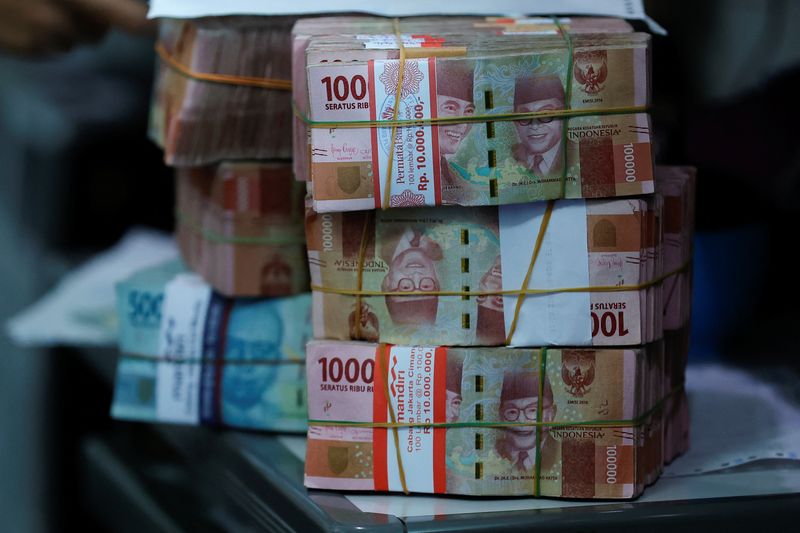By Ankur Banerjee and Patturaja Murugaboopathy
SINGAPORE (Reuters) - A sudden surge of foreign interest in Indonesian bonds may be reaching a peak, as investors see local interest rates holding steady while the outlook for U.S. rates again rises.
Also, analysts say, many investors have already bought the larger holdings of Indonesian bonds they sought in four months of strong accumulation - and are wary of an unusually large volume of issuance that the government has been planning.
January brought $3.3 billion worth of foreign money into the rupiah bond market, the largest monthly inflow since 2010.
It was also the fourth straight month of net inflows into a bond market that had become a notable beneficiary of a revival in global risk appetite. Investors looked to Indonesia as they saw signs of U.S. yields reaching a plateau and the end of China's zero-COVID policy, which implied boosts for commodity prices and emerging market currencies.
(Graphic: Foreign investors have poured into Indonesian bonds - https://tmsnrt.rs/3Z3oZV5)
But bullishness has faded since strong U.S. inflation and labour data this month suggested the Fed would push interest rates higher than previously thought. On Feb. 16, Indonesia's central bank kept its key interest rate unchanged and said the current level should be enough to guide inflation back to target.
Meanwhile, net issuance this year of around 700 trillion rupiah ($46 billion) of bonds, announced in August, would limit the opportunity for capital gain, analysts said.
"I'd be wary of putting on new positions from here," said Aninda Mitra, head of Asia macro and investment strategy at BNY Mellon (NYSE:BK) Investment Management, referring to Indonesian bonds.
The renewed hawkishness at the Fed was boosting the dollar, presenting a currency risk for investment in Indonesia and other countries, Mitra said.
"But if you already have an existing overweight on some of these things, I think they would continue doing quite well for a bit longer."
Data on capital flows shows most investors dumped emerging market bonds in 2022 as the Fed and other major central banks turned aggressive to combat rising global inflation.
That meant an erosion in "carry", the income from borrowing in dollars and buying higher-yielding debt elsewhere, such as in Indonesia. The dollar's rise alongside U.S. interest rates spelt capital losses in other currencies.
But sentiment had turned in November, said Ashish Agrawal, head of Asia currency and emerging market macro strategy research at Barclays (LON:BARC). Global investors returned to markets such as Indonesia.
The fed funds rate seemed to be peaking, upward pressure on natural gas prices in Europe was easing, the dollar retreated and China began dismantling its pandemic controls, he said.
The ICE (NYSE:ICE) BofA Indonesia government bond index has risen more than 6% since November.
(Graphic: Monthly foreign investment flows: Asian bonds - https://tmsnrt.rs/3k2qiVg)
ON-OFF AFFAIR
The rupiah is up 2.5% so far this year against the dollar, making it one of Asia's best performing currencies, and 10-year yields at 6.7% are double Indonesia's core inflation rate.
"Not only do Indonesian bonds offer some of the most attractive real yield relative to the rest of Asian markets; fundamentals had been strong alongside a well managed inflation backdrop," said Jerome Tay, a fixed income investment analyst at fund manager abrdn.
Investors have traditionally been cautious about Indonesia, because of its history of bursts of strong inflation and currency volatility.
Much of that has changed in the past couple of years, with fuel subsidies capping inflation while commodity exports have thrived, creating a trade-surplus buffer for the currency.
The historic vulnerability to high foreign ownership of Indonesian bonds has also declined, as Bank Indonesia has bought more bonds to rein in yields.
"It's a whole different ball game, which makes it a much better base for which to view that sort of asset allocation," said NatWest Market's emerging markets strategist Galvin Chia.
This year global funds had been lifting their exposures to emerging markets, Chia said.
"So that process I think is still ongoing, but most of that should still be done." He expects the pace of investment flow into Indonesia to slow.
Barclays' Agrawal also points to the pipeline of bond issuance by the government in 2023 and estimates gross 2023 issuance at 800 trillion to 850 trillion rupiah, as limiting the scope for bond yields to fall and prices to rise.

Indonesian government bond gains "are unlikely to hold as recent tailwinds lose momentum," Agrawal said in a note. "Supply-demand technicals are expected to deteriorate, as supply climbs and foreign investor purchases slow."
($1 = 15,185 rupiah)